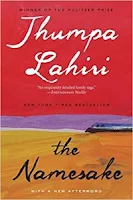“The Namesake” by Jhumpa Lahiri – The Immigrant Experience
Though the term has taken on a somewhat negative connotation amongst some people, being an immigrant is one of the most difficult and challenging ways of living that can be asked out of anyone.
Many people will never know what it is like to leave one’s country, family and customs behind and start from scratch once again, but The Namesake by Jhumpa Lahiri does a good job at giving us a realistic impression of it.
In this book, we are told the story of a young couple who, after an arranged marriage, decide to move to Cambridge, Massachusetts in hopes of starting a new life. While the husband is more readily adapting to the new way of life, the wife is more resistant to the assimilation, always clinging to memories of her life back home.
And then their son is born, named Gogol Ganguli after a Russian writer and a catastrophe. He too quickly learns that being the son of immigrant parents is far from being a walk in the park, being stuck between two worlds: the old Indian and the new American ones.
To get the bad things out of the way first, there are a few boring moments in this novel where it felt as if passages were added superfluously to inflate the page number. This is felt the most in one of the various long and useless descriptions of Gogol’s lovers; we learn virtually all about them, but it feels as if it was all for nothing.
Also, I had the impression that as the book went on, the story got increasingly weaker with less and less emotion and substance to it, which is far less than what is expected from a Pulitzer Prize winner such as Lahiri.
However, I have to say that despite that, not all is bad in this novel. For starters, Lahiri truly understands what it is like to go through the process of immigration and assimilation to a new country, describing the alienation in fascinating detail, hopefully helping those who haven’t gone through the process to understand what it’s truly like.
Also, the first half of the novel is pretty much devoid of useless passages and actually blesses with breathtaking descriptions and the retelling of extraordinary events. The characters themselves, for the most part, are believable, even though some of them start lacking depth starting at the second half of the book.
However, I have to say that despite that, not all is bad in this novel. For starters, Lahiri truly understands what it is like to go through the process of immigration and assimilation to a new country, describing the alienation in fascinating detail, hopefully helping those who haven’t gone through the process to understand what it’s truly like.
Also, the first half of the novel is pretty much devoid of useless passages and actually blesses with breathtaking descriptions and the retelling of extraordinary events. The characters themselves, for the most part, are believable, even though some of them start lacking depth starting at the second half of the book.
In the end, I had the impression that this is a story that would be much better-suited for a short story or something of the sort; all the filler content contributes to sucking bits and pieces of life out of this novel, turning what could have been a great story into a good one.
If you don’t mind imperfect novels and are looking to get a first-hand perspective of what it’s like to be an immigrant in a stranger’s land, I recommend you check The Namesake out.
 | Jhumpa LahiriJhumpa Lahiri is an Indian American author who was awarded the Pulitzer Prize back in 2000 for fiction, in addition to which one of her books, The Namesake, was made into a movie. She was also appointed by President Barack Obama as a member of the President’s Committee on the Arts and Humanities. |








Comments
Post a Comment